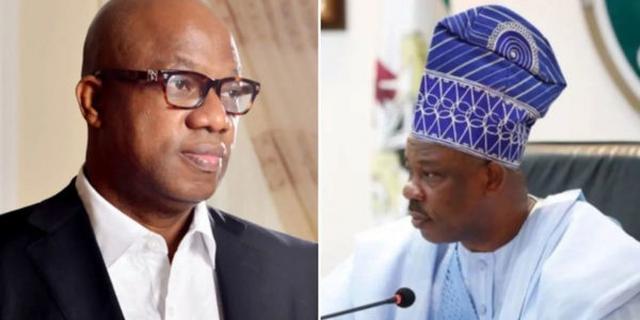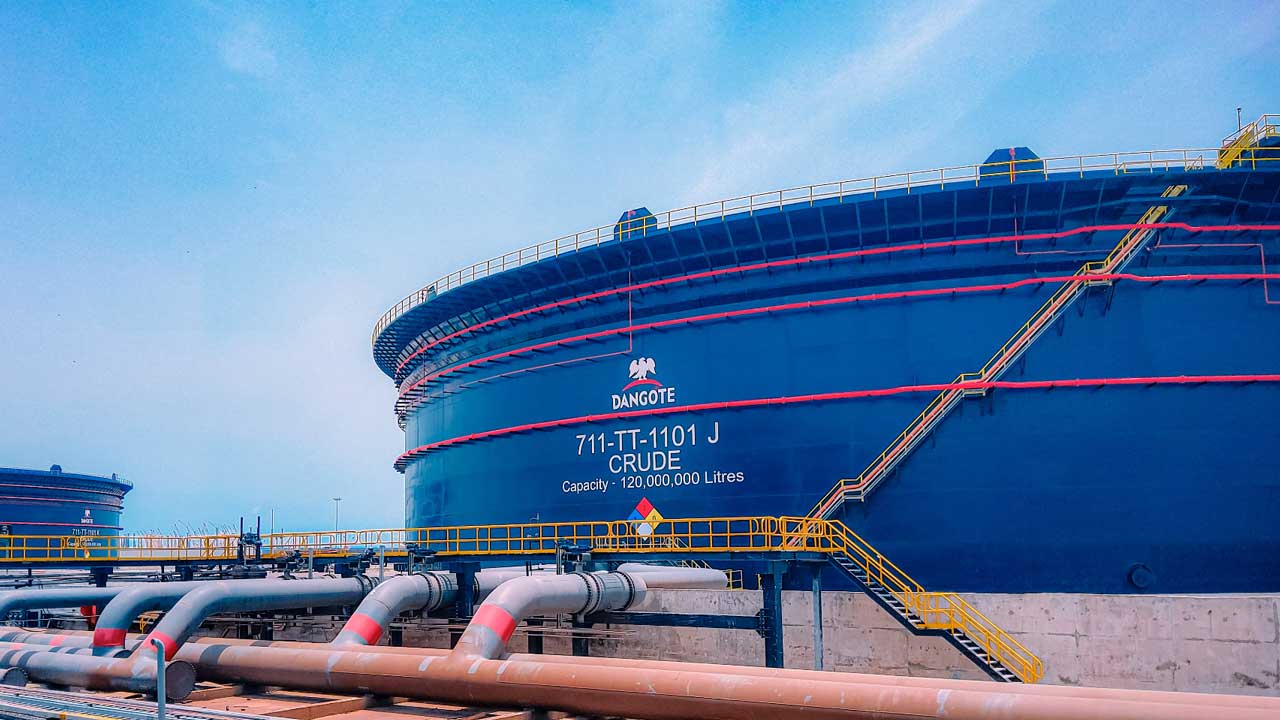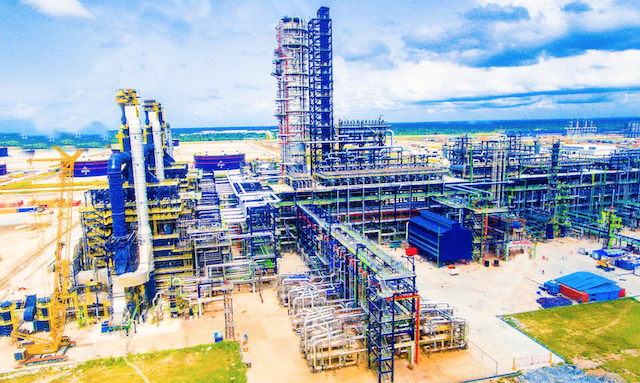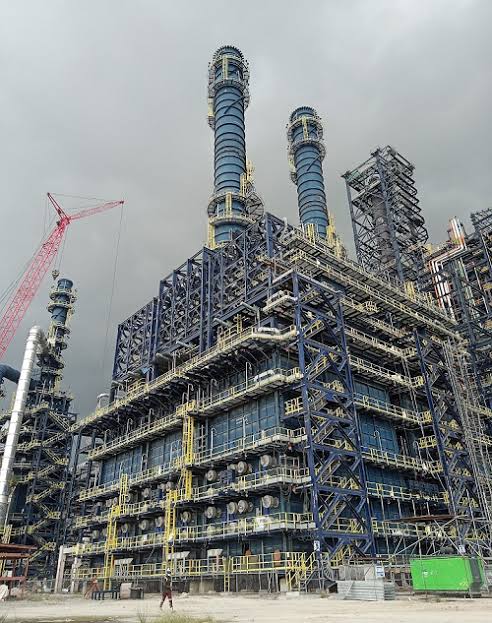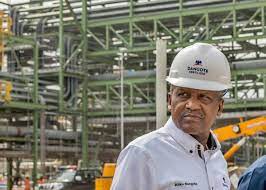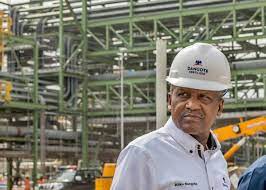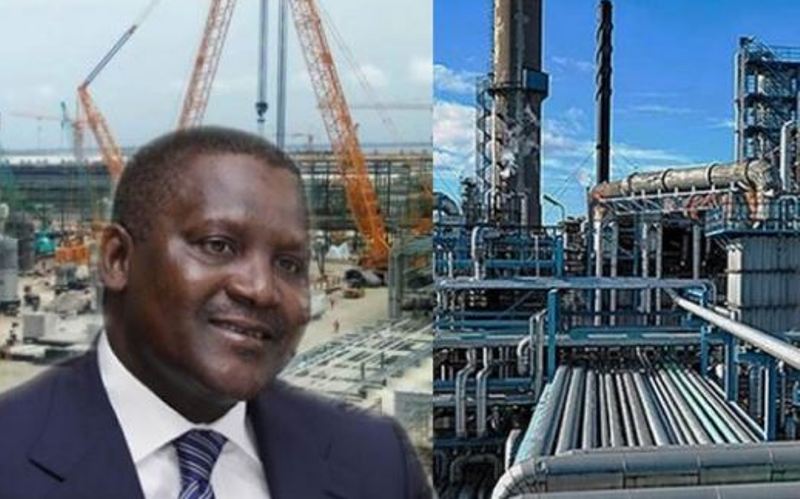Hitherto, Nigeria had been known as a net exporter of crude oil and a perpetual importer of refined petroleum products.
As we all know crude or raw products are sold for very little while processed or finished products attract much higher price.
That is the logic behind or the thesis in my book that is in the pipeline titled: “Africa Exporting Wealth,Importing Poverty”.
So,the kernel of the message in my forthcoming book is that when we export raw materials such as cocoa seeds and crude oil from Nigeria to Europe or anywhere in the world ,we are exporting wealth. And when we import processed cocoa based beverages and refined mpetroleum products from abroad, we are importing poverty.
That is simply because trade and economics dynamics dictate that raw materials which are the real wealth cost less,while processed materials attract costs that are multiple times,even as much as ten (10) folds more than the value of the raw materials.
The same principle applies to gas , gold, iron ore that are abundant in Africa being extracted and taken away in their crude form for processing or value adding overseas.
That inequality of value in raw materials endemic in Africa is largely responsible for Nigeria and indeed Africa being occupiers of the bottom rung of the ladder as the continent has remained home to the least prosperous countries in the world.
Worse still,apart from the raw materials that we export and which attract minuscule price as proceeds,when we export basic raw materials,we are also exporting jobs. That is because it is the factories overseas that process the raw materials into finished goods that would be providing jobs for youths of their own countries at the expense of our army of unemployed youths.
That is one of the reasons that our youths are literally wasting away in our country which is the origin of the raw materials that should have been processed at home to earn more income from overseas buyers.
Arising from the picture painted above ,it was gratifying to me that Dangote refinery would be the first privately owned business concern of its magnitude processing Nigerian crude oil into petrol. And it fits smugly into my desire to see a situation whereby our country would be adding value to raw materials by processing them at home before exporting the same products abroad with a view to earning higher income that would improve the balance of trade between Nigeria and her various trading partners around the world.
That would lead to the catalyzing of prosperity for our people and enable our country move from the bottom to higher levels in the perking order of the comity of nations of the world.
That is as opposed to just exporting raw materials which has been the lot of our country since Britain colonized her following the partitioning of Africa during the Berlin conference of 1884 whereby European countries shared Africa amongst themselves and the European country currently known as the United Kingdom,UK started exploiting Nigeria for her raw materials.
So,to me,the commissioning of Dangote refinery is significant in a personal way.
And for that reason Dangote refinery will be a strong reference point in my aforementioned book which is focused on why and how Nigeria and indeed Africa should add value to their natural produce that colonialists used to refer to as cash crops and solid minerals that were the main reasons that they targeted and literally raped our country and continent following a long period of pillaging her assets including human beings converted to slaves and shipped off to sugar plantations in the Caribbean and cotton farms in the Americas.
According to records,the exploitation started a couple of millennium ago via the arrival of missionaries on our shores ostensibly to spread the gospel of God. Thereafter,it expanded into slave trade across the Atlantic Ocean.
Subsequently,the extraction of the natural resources that abound in our country and continent became the attraction for colonialists and their new mission.
Having a Dangote refinery in Nigeria that would be reversing the ugly trend of Africa and Nigeria being net exporter of primary produce by exporting refined petroleum instead of crude oil,in a very elaborate way is very significant and heart warming to me and l guess to other patriotic Nigerians and indeed Africans.
Hypothetically,let us imagine that Nigeria was earning ten ($10) billion from crude oil sales annually.
By refining the crude petroleum products into petrol through Dangote refinery,the value would increase at least ten (10) folds. In other words,when crude oil is refined in Nigeria into petrol and exported, it would earn the nation about one hundred ($100) billion dollars,not just $10 billion if it had exported unrefined crude.
Would that not be the long sought golden age for Nigeria?
Having said that,at this juncture,it is pertinent and appropriate that l point out that when l raised the issue about the outgoing government not laying out any frame work for post petrol subsidy regime,in my article titled: “Elections 2023,Bruised Political Parties And Crushed Nigerians”published in my column way back in March l had no idea that Dangote refinery would be coming on stream so soon and it was the fall back position by government.
Here is how l raised my concern: “But up till now,there is no framework or plan on how the effect of the subsidy on the masses would be mitigated through policies and programs that would bring human face to the end of petrol subsidy regime which Nigerians actually desire”.
Amazingly,that concern was addressed by the just commissioned Dangote refinery and petrochemical plant that has a production capacity for processing 650 million liters of petroleum products and 900,000 polypropylene daily.
As the refinery that is touted as the largest single train petrol refinery anywhere in the world is being onboarded,Nigeria’s and Nigerian’s perennial battle with insufficient quantity and ineffective distribution of petroleum products that have had debilitating effect on the masses,appear to be in the process of being consigned to the past.
Since a song and dance had not been made about the development until a couple of days ago that the humungous complex got commissioned as the outgoing administration prepares to hand over the baton of leadership to a new pair of hands ,it would appear as if it is the best kept secret.
The Central Bank of Nigeria,CBN governor,Godwin Emefiele could not contain his enthusiasm about the commissioning of the plant as he gushed about being vindicated in the investment of the CBN funds (via NNPC 20% equity holding) in the monumental project despite skepticism from potential investors and financial institutions from the advanced economies of the Western world such as JP Morgan etc.
Overwhelmed by excitement,the apex bank helmsman who was over the moon that the construction of the petroleum processing project has finally come into fruition under his watch, revealed that about 70% of the loan for Dangote Refinery and Petrochemicals plant had been repaid even before the refinery commenced operation.
Mr Emefiele acknowledged that the revelation was against the wish of the promoter of the project,Aliko Dangote whose personal style is to understate his financial prowess. So,he might have been flustered by the exposition.
But in the spirit of the momentous and joyous occasion,and since it is in positive light,the self effacing Dangote Industries Chairman Aliko Dangote must have accepted the ‘expo’ (a colloquial tag for a leaked information) hence there has not been any rebuttal.
If indeed only 30% of the principal loan is outstanding (and the apex bank governor should know that since CBN invested about N125b for 20% stake) it would be such a cheerful and extraordinary development.
My bullishness about the new refinery in lagos stems from the fact that by establishing the monumental refinery, Dangote group has effectively taken over the function typically reserved for and undertaken mainly by sovereign governments owing to the sheer size of capitalization and coordination required.
Indeed,it is unprecedented that a local private entrepreneur would embark on a humongous investment of up to the tune of $18.5 billion in an infrastructural service such as the biggest single train refinery in the world that has the capacity to produce 300,000,000 liters of PMS daily which is way more than the demand of Nigerian petroleum products consumers.
What the apex bank helmsman’s revelation simply implies is that only 30% of the $18.5 billion dollars loan is outstanding before the cost is fully paid up for the gigantic complex that would have a multiplier effect,not only on Nigerian economy,but that of the African continent,particularly the west African sub region which has been a ready and steady market for smuggled petrol out of Nigeria.
As we very well know,our neighboring countries have been the veritable receptacles for smugglers of our subsidized refined petrol,which is four (4) times cheaper in Nigeria,across our borders into their domains in connivance with unscrupulous Nigerian business men /women.
On the reverse side,the inflow of an assortment of banned products from neighboring countries ranging from frozen chicken,rice and sugar into Nigerian market including small arms and ammunitions facilitating deadly religious Insurgency,terrorism,pastoralists and farmers clashes as well as environmental rights and resource control agitators/militants, not forgetting separatist movements that have also been threatening to tear Nigeria apart.
All of the above cross border smuggling activities are generating negative consequences on our economy resulting in genuine local entrepreneurs who pay requisite taxes to government not being unable to compete in price with the smuggled products.
That is the situation that prompted or informed government’s decision to close our country’s borders with neighboring countries from August 2019 for an unusually lengthy period (about one year) with punishing effect on Nigerian masses.
But it came with the salutary benefit of the populace learning to consume what they produce by weaning themselves of the acquired tastes that have been causing the bleeding of the treasury of our country via export of capital arising from our unbridled love for foreign made goods and their importation.
It is for the foregoing reasons that people in authority like CBN’s Emefiele believe that the national border closure is one of the factors that facilitated Nigeria’s self sufficiency in rice production for which he has been patting himself and the outgoing administration on the back.
In terms of investment in some sectors of the economy to stimulate activities and engender growth of our economy,the apex bank’s helmsman also explained that about N9 trillion naira has been invested in priority areas via interventions in entrepreneurial ventures such as rice farming etc at single digit interest rates loans to Nigerians.
Such financial interventions includes the injection of approximately N125 billion (20% NNPC equity) that was revealed as having been extended to Dangote group for the construction of the first private and largest refinery and petrochemical plant in Nigeria.
In the reckoning of the authorities,the closure of our national border last year for about one year also enabled our country have a good idea of the quantity of petrol being smuggled across the borders to neighboring countries.
And it is the process of ripping -off government by nefarious businessmen that is the key factor fueling the ballooning of the volume of petrol purportedly being used by motorists in the country between 60-66 million.
Without subsidy,the volume of petrol imported into Nigeria may actually be half of what is being bandied by the agencies in charge-NNPC and its subsidaries/affiliates involved in oil/gas assets management.
Arising from the fraud (volume gauging) inherent in the subsidy driving the smuggling of the products across borders which is at least sometimes four (4) times more expensive in neighboring countries ,the quantum of funds applied in sustaining it also rose dramatically from N307 billon in 2015 to between N4-6 trillion in 2022.
That simply means that the exponential increase in the quantity of petrol claimed to be consumed in our country is driven by the N4 to N6 trillion that was sunk into sustaining the wrong headed policy last year alone and and N3.5 trillion from January to June this year.
And going by the figures above,it would amount to nearly N10 trillion that has literally been flushed down the drain between 2022 budget and half of 2023 ending next month,June when the incumbent government is supposed to end the economically destructive petrol subsidy regime.
Cumulatively,the humongous quantum of funds estimated to be in the neighborhood of N10 trillion budgeted in 2022 and 2023 as petrol subsidy are part of the estimated $15 billion believed to have been the sunk fund on subsidizing PMS in the past decade or so.
Drawing from the statistics that the estimated N6 trillion expenditure on petrol subsidy in 2022 national budget outstrips the entire income/revenue of N5 trillion generated from petroleum by our country last year,the concept of implementing petrol pump price subsidy that has literally gobbled up our country’s entire revenue moves from the realms of absurdity to sheer lunacy by our leaders.
And that is underscored by the fact that no reasonable justification could be adduced for such irrational policy that has practically kept our country on a ruinous path.
Is it not depressing how strong headedness about terribly wrong policies such as subsidizing petrol pump price and propping of the value of the naira against foreign currencies have prevented our country from truly becoming the giant of Africa,not just in name but by its positive impact on the entire continent by unleashing its huge untapped potentials as the establishment of Dangote refinery has capacity and ability to end food and energy insecurity on the continent ?
It is in the light of the above that it is such a welcome relief that the coming on stream of Dangote refinery can be deemed as a panacea to the myriad of socioeconomic ills that have been dogging and have therefore stagnated our country.
Put succinctly,apart from the narrow perspective of the possibility of steady supply of refined petroleum products in Nigeria to ease the pains suffered by the hapless masses that have been enduring endless search for petrol in retail stations that could last for days and even weeks staying on queues to purchase the commodity which is the prism from which most analysts have been considering the arrival of Dangote refinery on the Nigerian and indeed African oil/gas landscape: the focus of this essay is on the all encompassing impact of Dangote refinery and petrochemicals plant on the economic,social and political environment in Nigeria and indeed the continent of Africa.
To drive my point home,l intend to put into array,how Dangote refinery and petrochemicals plant can be linked to the improvement of social,economic and political fortunes of Nigeria and Africa as a whole.
But before doing that,l would like to crave the indulgence of readers to allow me first of all dwell on how the other positive factors which the crude oil refining behemoth could engender, appear to have eluded some of those in the corridors of power.
Apparently,apart from members of the public,a lot of government officials were also ignorant of the intention of the Buhari government to fall back on Dangote refinery to make up for the lack of products from the four (4) government owned refineries built in the mid 1980s under the watch of president Buhari in his first incarnation as military head of state 1984-85.
The refineries located in Portharcourt, Rivers state ,Warri, Delta state and kaduna, Kaduna state have been out of production for at least a decade.
That is despite the billions of naira that have been invested in multiple turn-around maintenance,TAM over the years, including an ongoing turnaround maintenance procedure in both Portharcourt and Warri refineries.
Soon, the Port harcourt and Warri refineries undergoing refurbishment would be in operational condition and given that government really has no business being in petrol refining business,it is expected that they would be farmed out as concession to private sector operators or sold outright as president Olusegun Obasanjo had done in the twilight of his administration in 2007 by selling the Portharcourt refinery incidentally to Dangote group but the sale was rescinded by his successor.
Since it is the unproductiveness of the aforementioned refineries arising from the mismatch of applying civil service bureaucracy and mentality of inefficiency in operation of petroleum processing and distribution that should be driven by the ethos of efficiency intrinsic in the private sector; is the reason that our country has been importing petroleum products from European,Indian and South American based refineries to meet its needs.
And it is a situation that has been made worse since 2017 when the importation of Premium Motor Spirit,PMS and kerosene became the exclusive preserve of NNPC ltd,making it a monopoly and thus inflicting associated negative effects on the economy.
But with the arrival of Dangote refinery in the petroleum in the down stream sector,it is envisaged that the NNPC Ltd monopoly would be broken as the distribution of petroleum products would become open to all Nigerian entrepreneurs that are interested and have capacity to engage in the business as they would no longer be any need to import refined petroleum products.
ln fact it is the position of CBN governor Emefiele that the import bill of Nigeria for petroleum and fertilizer is in the range of $26 billion dollars annually.
Hopefully,with the advent of Dangote refinery and petrochemicals plant,the high cost of foreign imports of petrol and fertilizer would be drastically reduced as most of our needs for those commodities would be met locally.
If that becomes the case,then multiple medium and small scale entrepreneurs that abound in our country and are yet to attain their full potentials would be unleashed and their activities would boost the economy in terms of GDP and GNP.
As elementary economics teaches ,it is small and medium scale entrepreneurs that are the backbone of most economies of the world.
For that reason the authorities should harness the benefits inherent in the engagement of SMEs as the backbone of prosperous economies by enabling them engage in oil/gas trade when the monopolistic role of NNPC Ltd in the importation of petrol is discontinued.
It is gratifying that the emergence of Dangote refinery which is in-country would fill the gap by putting an end to the stranglehold of NNPC ltd on refined petrol importation and distribution.
So,just as fast consumer goods manufacturing corporations like Lever Brothers,Coca-Cola,PZ Cussons,Flour Mills of Nigeria,Dangote Cement etc appoint distributors to take their products to the last mile,Nigerian entrepreneurs can procure petroleum products PMS,DPK, Aviation fuel ,AGO and other derivatives from Dangote refinery for retail to all Nigerians down the value chain.
Clearly,the strength of the emergence of Dangote refinery and petrochemical plant lies in the fact its positive effect extends far wider than being a game changer only in the petroleum market because it has the capacity to impact the entire economy of Nigeria and even Africa as a whole.
But the likes of Finance minister Mrs Zainab Ahmed for instance did not see the advent of the first privately owned major crude oil refinery (Dangote) as a panacea since it is poised to be a mere counterforce to the impending petrol subsidy removal as it would at least guarantee adequate and regular supply of petrol in our country.
Hence the minister was focused on the disbursement of the $800 million loan from the world Bank to the federal government which she said is being targeted at providing palliatives that would serve as cushion to the poorest of the poor in Nigeria against the negative effects of petrol subsidy removal.
Beyond the nebulous social safety schemes for the poor that is fraught with fraud ,what should be celebrated is the welcome relief that petrol from Dangote refinery would soon be available to Nigerians,(when it goes into active production in the next couple of months) resulting in sufficient petroleum products being supplied into the market thereby saving the masses the hardships hitherto suffered while trying to find it.
A cost/ benefit analysis reveals that with Nigeria having a functioning in-country privately owned refinery,the shipping and other costs such as logistics and storage of refined products incurred and which are usually passed to the consumers when the commodity is imported from abroad would be saved.
And that is where the direct benefits ends.
The rest is indirect benefit to the economy since the coming on stream of Dangote refinery does not mean that petrol pump price would drop in any significant way even if subsidy is not removed.
It is a point that was emphasized by Mr Melee Kyari,the Chief Executive Office ,CEO of Nigerian National Petroleum Company Ltd in his speech at the Dangote refinery launch last Monday 22 May.
And as the CBN governor Emefiele also emphasized,only about 20% of the cost of petroleum products may be saved arising from the fact that there will be no need to store products and engage in other logistics activities which is currently part of the cost dynamics of petrol import and distribution in our country.
Going back to the linkage between Dangote refinery and the social , economic and political well being of citizens of our country and Africans as a whole,it is trite to restate the fact that with the refinery coming into the energy security mix,refined petroleum products would be available on a steady stream of supply and the misery of pinning away in search of the product which had become a perennial experience for Nigerians would be consigned to the dustbin of history.
During the last petrol scarcity in the last quarter of last year and the first quarter of this year ,it may be recalled that a viral video of a lady who due to the frustration of not finding PMS to purchase went berserk in a petrol station in ikoyi where she stripped herself naked after alighting from her car and getting hysterical. That video trended heavily in the social media.
Avoidance or prevention of the reoccurrence of such situation which would be made possible via sufficient supply of petrol from Dangote refinery is by implication one of the positive social impact and linkages to society.
So also would our crude oil that is sometimes stranded in the international market when sometimes we are faced with the challenge of lack of buyers as reflected by a country such as the USA that has been a traditional buyer of petroleum from our country currently pivoting to or patronizing other sources of energy.
Going forward a significant volume of our crude oil would be processed by Dangote refinery which has the capacity for processing enough volume to meet our local demand and also export as refined products, not crude oil which has hitherto been the case.
As such meeting our OPEC quota would no more be such a constraint when our crude oil production is ramped up in the new era as enunciated in Renewed Hope 2023 manifesto of the incoming administration.
On top of the benefit of exporting refined petroleum products to earn more foreign exchange ,it is envisaged that the gigantic industrial complex located smack in the heart of Ibeju-Lekki,Lagos state capitals covering an area said to be seven (7) times the size of Victoria island, would create a humongous number of direct jobs at least during the initial stages numbering up to 100,000.
According to sources within the refinery,about 10,000 has already been generated during the construction stages. More would be created through the value chain of distributors that it would attract thereby reducing unemployment in the country currently at an alarming rate of 41%. It is also in a position to boost the aggregate Gross Domestic Product,GDP of our country presently at N51.24 trillion and growing at 2.3% according to statistics from National Bureau of Statics,NBS
It is a no brainer to also state that the presence of Dangote refinery would also lead to prosperity and well being of Nigerians currently mired in poverty more than at any other time in the history of our country ,except during the civil war,1967-70 due mainly to the foolhardiness of applying more than our country earns as oil revenue on subsidy for petrol.
That to me is the economic content and linkage that Dangote refinery would be bringing to the table.
Furthermore,the presence of additional people in employment in Nigeria would enable our country free itself from being the poverty capital of the world which is an unenviable title that it inherited from lndia a couple of years ago.
As studies have proven,when citizens are productively engaged and prosperous,the type of ethnic and religious differences currently tugging at the heart of Nigeria’s unity would diminish.
And Dangote refinery and petrol chemicals plant is being touted as being able to create as many as 300,000 jobs when it is fully on stream.
That implies that as a result of being enmeshed in work provided by industries such as the ones springing forth from the birth of Dangote refinery,the number of Nigerians that would be seeing each other from the lenses of tongue,creed and faith which breed hate that has been the trigger for the conflicts and crisis bedeviling our beloved country, would be drastically reduced.
So,reducing or eliminating ethnic supremacy or dichotomy and the resultant strife are the gains from political angle arising from the presence of Dangote refinery in our country.
By and large,Dangote Refinery and Petrochemicals plant is poised to be an omnibus of sorts that would give birth to multiple endeavors including packaging materials which would be revealed sooner or later
Just as l was wrapping up this article ,l received from a friend a social media post which goes thus:
“Dangote came into sugar production and the price never come down, today a bag of sugar is #41,000.
“Dangote came into cement production and the price never come down, today a bag of cement ranges from #4,500 to #5,500.
Dangote came into noodles and spaghetti production and the prices of noodles and spaghetti never come down, today the price of 1 (pack) of noodles rose from #30 to #120 and price of 1 spaghetti rose from #60 to #600.
“Now same Dangote is now into refinery and (u) you are jubilating that the prices of petroleum products will come down.
May almighty God continue to bless this country.”
As is typical in our country, there are bound to be naysayers or skeptics who question change. And l hasten to point out that it is well within their rights to so do.
Below is my response to cynical comment above : Dangote Refinery and Petrochemicals plant is envisaged to create 100,000 jobs in Nigeria which would result in prosperity for that number of people and their families.
It would also boost the Gross Domestic Product,GDP and Gross National Product,GNP of our country due to the number of Small and Medium Scale Enterprises,SMEs that would be engaged in distributing and using the by-products from the refinery to create other goods such as plastics etc even as it would also stop our country from exporting capital abroad to the tune of about $26 trillion estimated to be expended in the importation of petrol and fertilizer annually based on CBN sources.
And on top of that our country would also earn foreign exchange from other countries particularly our neighbors that would be importing petrol from Nigeria as opposed to the smuggling of petroleum products from Nigeria to their countries which is having negative impart on the economy of our beloved country. A rough estimate is that there may be inflow of at least $3 billion at the initial stage from the sale of refined petrol from Dangote refinery.
The same friend also forwarded to me a twitter post on the same Dangote refinery issue that l presume is from the verified handle of the renown newspaper columnist and former aide on digital media to former president Goodluck Jonathan , Mr Reno Omokri.
It goes thus:

Below is my response to my friend:
Nigeria needs beer and petrol manufacturers.They both serve different purposes in the life of our people.
And we need more Aliko Dangotes and Samad Rabius to create more Africa-centric behemoths in other critical sectors such as agriculture/food production to enable Nigerians enjoy food security and also provide raw materials for multiple industries and facilitate production of medications/drugs in industries such as pharmaceutical firms amongst others.
For instance, the Nasarawa-Benue states axis in the north central region of Nigeria in my view is the citrus belt equivalent to what obtains in the state of Florida in the United States of America,USA from where most of the citrus in that country is produced.
Just like Dangote Refinery and Rabiu’s refinery-when it comes onboard,Nigeria is looking and waiting for more of such mega entrepreneurs to take the bull by the horns and venture into producing what we consume in our country and continent and wean our selves of dependence on Europe,Asia and north North America.
Also let us not forget that the financial services sector such as banking is dominated by southerners such as Mr Jim Ovia of zenith bank,Mr Segun Agbaje of GTBank,Mr Tony Elumelu of UBA ,Mr Herbert Wigwe and Mr Aigboje Aig-Imoukhuede of Access bank to mention just a few that own and run very successful banks with tentacles spread across the continent of Africa.
So,in my view there is no basis for berating members of one tribe or the other for investing in one area of business or the other.
We operate a free market economy in Nigeria which is unlike government where bureaucrats determine who goes where.
That is basically because in the private sector ,market forces dictate how entrepreneurs play in them.
The idiomatic expression of lgbos below illustrates my point poignantly:
Egbe belu, ugo ebelu. Onye si ibe ya ebene nku kwa ya.
Loosely translated to English language as:
Let the eagle fly and perch let the kite do the same.
Anyone of the birds that tries to prevent the other from flying and perching ,may it have its wings broken.
Finally,my take away from the gigantic step taken by Africa’s richest man Aliko Dangote in setting up the world’s biggest single train refinery in Lagos,Nigeria is that there is hope for Nigeria to overcome food and energy insecurity currently wracking it.
If we have more entrepreneurs with Dangote’s type of appetite for risk taking-that would engage in a leap of faith by taking big stakes in producing what we consume from the vast array of land and natural resources that abound in our country,Nigeria would join the comity of industrial and prosperous countries sooner than can be imagined.
In fact ,Chairman Aliko Dangote’s giant strides in that respect can be taken as proof of concept other entrepreneurs.
Now,ahead of Dangote group,former president Olusegun Obasanjo,OBJ, soon after exiting office as military head of state had a similar mindset by founding Obasanjo Farms in 1979 which is some four (4) and half (1/2) decades ago.
But it suffered set backs and failed to flourish perhaps owing to the fact that it did not enjoy government support as well as patronage in the way that Dangote refinery is presently making waves simply because the authorities see its as its rescue from and insurance against energy and food insecurity that has been bedeviling our Nigeria.
That is without discounting the fact that Dangote Petrol and Petrochemical plant promoter, Alh.Aliko Dangote has a formidable track record of being a very business savvy entrepreneur.
Another major attempt by President Obasanjo to industrialize Nigeria through entrepreneurship was when under his watch in 2004, he floated the concept of Transnational Corporation of Nigeria,Transcorp. It is a private sector driven platform promoted by government with stakes allotted to wealthy Nigerian entrepreneurs with the goal of getting them to explore priority sectors of the economy including hospitality,oil and gas as well strategic infrastructure for investment.
It was coordinated by Mrs Ndi-Okereke Onyuike former Chief Executive Officer,CEO of Nigeria Stock Exchange,NSE.
And it was modeled after South Korean Chaebol concept which was very successful as it is the origin of prosperous corporations such as Samsung, Hyundai,SKG as well as LG etc which are family owned conglomerates that dominate South Korean economy.
Transcorp,although not family arrangement which South Korean Chaebols are,is a government set up with private sector flair that had not fully attained maturity before OBJ’s presidency ended.
So,while the interest of most of the original stake holders waned,that of Mr Tony Elumelu waxed stronger. And it is the reason that he currently controls Transcorp and most of the founding investors exited.
A close study of the origins of Chairman of Dangote group,Aliko Dangote’s entrepreneurial trajectory or antecedents would reveal that seeking new frontiers to conquer is part of his DNA.
The assertion above is backed up by records that indicate that the journey into setting up the Dangote refinery commenced after his purchase of two brown field refineries from government under OBJ’s watch (2006/7 that was reversed by the regime that succeeded OBJ.
And he had to,so to speak,get the disappointment out of his chest by getting even with the authorities by establishing the biggest single train refinery in the world which has just been commissioned, some fifteen (15) years after he got cross with or was literally pissed off by government.
I am aware that he was also spurned by government when he bided to purchase Peugeot automobile assembly plant in kaduna from Assets Management Corporation of Nigeria,AMCON.
Again,he did not only just get upset,he literally got even by going to France to obtain Peugeot franchise with which he has recently set up his own automobile assembly plant in kaduna close to the location of the Peugeot plant that he was denied opportunity to purchase and it is named Dangote Peugeot.
Having scaled the refinery huddle by getting it commissioned on Monday 22 May,it is being expected that the Dangote Peugeot automobile plant that had long been fully installed and ready to start rolling vehicles off its conveyor belt would be commissioned and thereafter go into operation very soon.
Following the same trend,perhaps the federal government should put up the railways for sale so that Alh.Dangote would express interest and government would then renege,so that the serial investor would once again be fired up to set up his own railway service.
Seriously, my gut feeling based on a trend analysis of Dangote’s investment record is that such disappointment may inspire Africa’s richest man who based on experience believes nothing is impossible to set up a parallel railway service in Nigeria.
Should Dangote railway materialize ,it would have a seismic effect on Nigerian socioeconomic landscape as it would accelerate our country’s much sought industrialization.
In conclusion,digging into the investment mogul Dangote’s past,it reveals the fact that prior to his current foray into the world of crude oil refining,he had been playing in the commodities sector.
He first started by importing and distributing sugar,salt,pasta ,rice and cement.
Thereafter,he expanded into producing all the commodities locally and around the harbor in Lagos before setting up the largest cement factory in Nigeria-Dangote Cement located in Obajana,kogi state.
Today,he dominates the cement industry by branching out to fourteen (14) African countries after overtaking the former leaders in the industry in Nigeria such as Lafarge and flour Mills etc.
My guess is that it was after that conquest that he decided to make a foray into fertilizer production and crude oil/petrol chemicals refining business which he has as usual,and by all indications, taken by storm.
Presently,Dangote group is dominating in the fertilizer market which is a space where multiple large,medium and small operators abound. And have entered the crude oil processing sector with the commissioning of the Ibeju/Lekki plant,the group has also taken pre-eminence.
As part of natural progression,perhaps the world of liquified natural gas which Nigeria has in abundance,even much more than crude oil,would be a new area of fascination for the boundless industrialist,Aliko Dangote who is constantly seeking new grounds to break.
The justification for urging our entrepreneurs to venture into the world of gas gathering is underscored by the fact that our country currently flairs the commodity which is highly in demand in Europe and around the world due to the incidence of ostracizing Russia the erstwhile Europe’s largest supplier of the commodity following its invasion of Ukraine in February last year.
An evolving trend which l am still trying to figure out whether it is by design or a mere happenstance is that it is the sectors or businesses that government has failed to sustain or divested from that Dangote group has been slowly but surely and successfully filling the void by investing heavily in the industry .
The assertion above is buttressed by the fact that it is usually when government-federal or states- investments in cement factories started faltering that Dangote either started setting up greenfield or buying up poorly performing brownfield cement factories.
Likewise when fertilizer firms funded by government started wobbling or folding up, Dangote group invested massively in the sector by setting up its own greenfield plant until it gained dominance.
Similarly,when the last automobile assembly plant-Peugeot in which government had control by virtue of its being under the management of AMCON was wobbling , Dangote attempted to buy it up.
When it did not succeed,it decided to set up its own greenfield automobile assembly plant -Dangote Peugeot.
The unique and curious trend came into full circle when it dawned on me after a keen observation that it is only after its purchase of NNPC refinery was cancelled that Dangote group took the initiative of making the colossal investment of $18.5 billion in the Lagos based refinery and petrochemicals plant that he started constructing since 2017.
What the pattern described above suggests to me is that Dangote group is wittingly or unwittingly moving into areas from which government is withdrawing voluntarily or due to market forces and it has so far done so successfully.
So basically, it seems like the Dangote group is practically standing in the gap for government as it has been moving into the spaces exited by government thereby fulfilling the principle or dictum: government has no business in business.
To the best of my knowledge,the strategy, assuming it is by design and not a mere happenstance,is really not unique to Dangote group.
Rather, it is basically similar to, but not the same strategy with Femi Otedala’s corporate raiding style of buying up shares of firms quoted on the stock exchange that are performing below par with a view to taking them over as validated by his actions in buying up the controlling shares in First Bank of Nigeria,FBN and doing same with Transcorp before selling the shares back at a huge premium to Elumelu.
Finally,whether it is Dangote group or any other members of the billionaires club in Nigeria which Aliko Dangote led as chairman in providing succor for Nigerians in the wake of the COVID-17 pandemic in 2020 via a platform named CACOVID,it would be in the best interest of Nigeria and Nigerians that the gas sector becomes an area of massive investment of the size and dimension that Dangote group has made in the crude oil and petrochemicals refining sector.
And harnessing the potential benefits that processing of gas offers should be a proposition in which the incoming administration must show more than a passing interest.
As an affirmation of its declaration in its Renewed Hope 2023 manifesto to accelerate industrialization of Nigeria and boost employment for our teeming youths,as well as engender prosperity for the masses, it must do well to walk its talk by offering support to potential investors in gas gathering and its export in the manner that the outgoing government took the bold step of staking 20% in the $18.5 billion Alh.Aliko Dangote owned Dangote Refinery and Petrochemicals plant that is poised to have multiple benefits to Nigerian economy and society at large.
Magnus onyibe,an entrepreneur, public policy analyst ,author,democracy advocate,development strategist,alumnus of Fletcher School of Law and Diplomacy,Tufts University, Massachusetts,USA and a former commissioner in Delta state government, sent this piece from lagos.
To continue with this conversation,please visit www.magnum.ng

